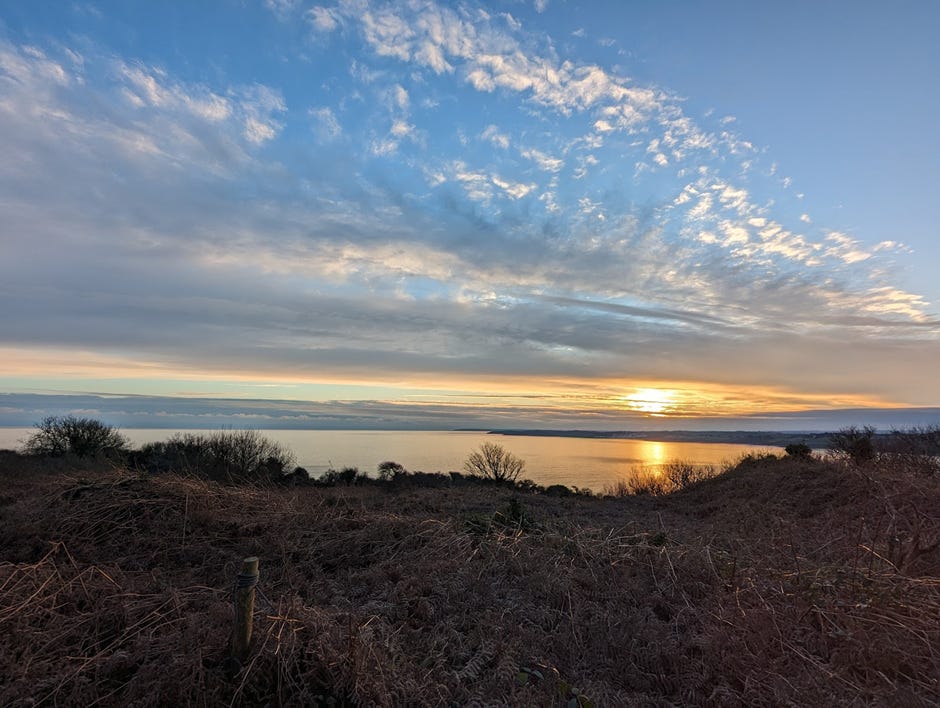On the benefits (or not) of cold water swimming
I dip my toe into this topic with some considerable caution and not just because it is bloody cold. Cold water swimming has an enthusiastic, dare I say cult following. This includes at least 2 of my colleagues, a handful of friends, my cousin and my sister. All of whom took umbrage when I dared to question its unique benefits.
Much has been made of cold water swimming as a panacea, often in the context of ageing and wellness, particularly by those who sell retreats which involve cold water swimming. And I’m not completely against the idea. It can be the best feeling, I’ve some in mountain lakes in Switzerland, Wales and the Lake District. Quite a few of those dips have been naked because I forgot to bring my trunks. On one memorably terrible time, I was about to take the plunge and for some reason decided to take my wedding ring off for safe keeping, immediately losing it on the shale of Brighton beach. In some miracle of modern technology, a friend used his phone torch and found it.
As part of the research for my book Live Forever? A Curious Scientist’s Guide to Ageing, Wellness and Death I undertook a number of self experiments. One of which was cold water swimming. I’ll confess now, I didn’t go hardcore – I waited till late March (average water temperature 10°C) as opposed to the current water temperature in the UK (3°C).
I recorded the outcomes in an entirely subjective way.
Day 1. Weather rainy and windy; sea temperature ten degrees Celsius. Alone (my daughter refused to join me because of the rain). Length of time in sea – five minutes. It was only this long because I shared the beach with someone else who had clearly just been swimming and I felt ashamed by my weakness.
Day 2. Weather rainier; sea temperature still cold. With daughter for five minutes, but she got out quickly because she only had one sea shoe – the matching one having been lost six months previously. Length of time in sea – ten minutes. I lasted longer because I remembered my wetsuit gloves this time.
Day 3. Weather windier; sea temperature unknown. With family. Length of time in sea – zero minutes. We had changed beaches to the rougher north Cornish coast to discover waves crashing on the sea wall with enough force to break bones. Whilst internal bleeding probably would lower blood pressure, we decided that discretion was the better part of valour.
Days 4–6. Some sun, not warm. With extended family. Length of time in sea – thirty minutes.
Because I am a proper scientist, I repeated the whole experience a year later – no reproducibility crisis in my research! I confirmed the original findings, the English Channel in late March is bitterly cold, but spending time in it with my family is fun. Sea-swimming did seem to resolve a calf injury I had given myself, so score one to the curative properties of cold salty water.
From my studies, it looks like I made some amazing breakthrough in resilience, but being honest, most of the increase in swim length came about because the weather improved and I remembered all the right bits of kit. Having (finally) warmed up, I looked into the delicate balance between the pros and cons of cold water swimming. Cold water swimming is not without risk. Most advice emphasises that cold water can lead to shock, arrhythmia and hypothermia; none of which sounds that healthy. One scientific paper stated that whilst cold water has some health benefits for the already healthy, ‘there is a risk of death . . . either due to the initial cold shock or progressive decrease in swimming efficiency’.
One of the things often attributed to cold water swimming is immune boosting, with anecdotal evidence about reducing the number of colds swimmers get. We discussed this at length on a recent episode of Inside Health on BBC Radio 4 so after reading this, listen and draw your own conclusions!
I do sometimes wonder if in this secular age, there is a more sacral component to the cult of cold. Doing something slightly flagellistic with other like minded souls. In the end the benefits come back to the key lesson I learnt whilst researching for my book – social connectivity is good for us. So if this works for you, carry on. The combination of physical and social has a synergistic benefit on our lives. (But do take care – especially on a windy day like this, swimming can be dangerous). But if you prefer not turning blue on a beach, try something else. In the end, the answer of how to live longer and better is do more of what you like with people you love.
I am slowly migrating
content onto substack.
So if you have been following
me there please follow me https://substack.com/@professortregoning





